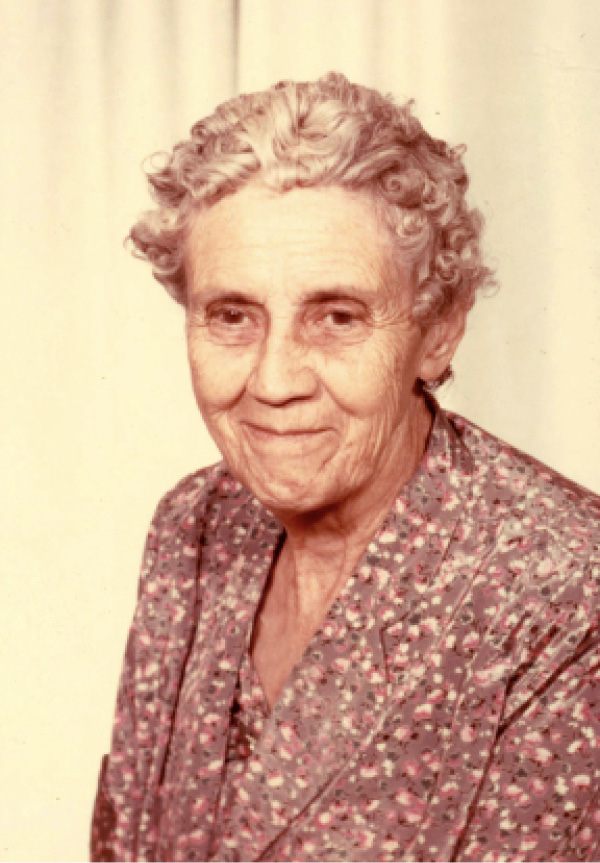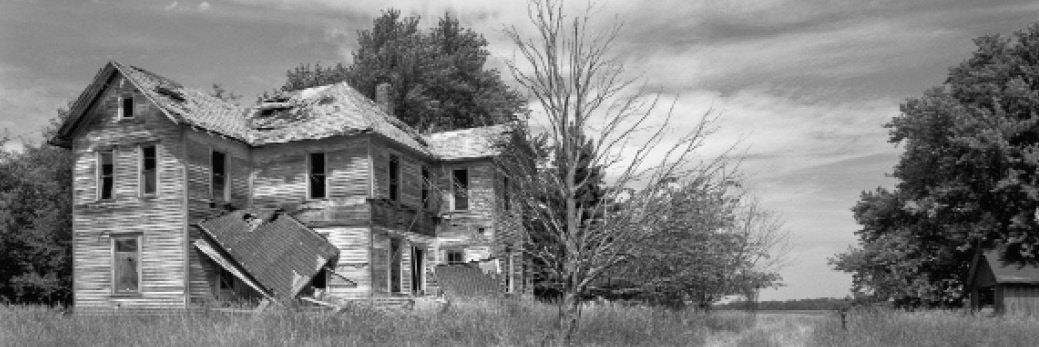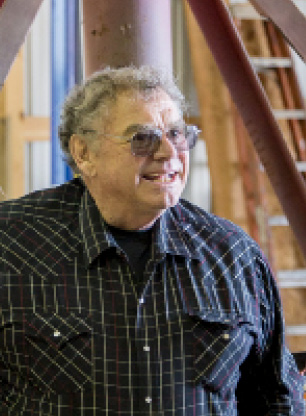Emma Schnell (age 25) married Hugh Cassius McDonough (age 27) on November 28, 1906, and settled down to farm in Richland Township, Jasper County, Iowa. They were the parents of four sons, and I am the son of one of those four. In addition to farming, my grandfather did blacksmith work and made harnesses in the winter months. As long as Grandpa was able to farm, Grandma was the one who took care of the business details, quite unusual for a woman in those days. This involved buying and selling the livestock, grain, and farm equipment. She also made most of the work plans for the week for my father and uncles. Every Sunday morning after church the family would gather and discuss the next week’s work plan. My grandparents worked hard, and approximately every eight years of their married lives were able to buy an additional farm.
Preparing a Meal
My earliest memories of Grandmother McDonough are my overnight stays at her home. For a long time I was the only grandson (though there were five granddaughters older than me), so I sometimes got to stay with her by myself. On such occasions I usually got to help her prepare dinner. The hogs had been fed earlier by scooping ear corn onto the large cement slab next to the corn crib, and after they had eaten we went to pick up the cobs for her cook stove. There would already be a fire in the stove from breakfast, and Grandma would fill the fire box with cobs and put the big tea kettle on to heat water. She knew exactly how many cobs it took to boil water, cook a meal, bake a pie, or anything else. She also knew how many strokes of the hand pump at the well it took to fill the large tank in the attic, and by helping with this we children learned to count even before starting school. We also counted the eggs when we picked them up from the hen house.
I remember one time, after the cobs were in the stove and the tea kettle on to boil, Grandma and I went out and picked enough cherries to make a pie since company was coming for dinner that day. Then we caught a big white rooster to fry. She had both red and white roosters, but on this occasion she chose a white one because its pin feathers did not show as much as those of a red rooster, and she wanted the bird to look good. She chopped off the rooster’s head and I held it up so it would bleed out well. She went in to get the tea kettle, put the rooster in a five gallon pail, and poured the boiling water over the bird to make the feathers come off easily. She plucked it, took it into the house, cleaned out the innards, and cut the bird into pieces. She dipped the pieces in flour and browned them in a hot iron skillet, then placed them in a heavy Dutch oven and into the stove. After that we pitted the cherries, rolled out the dough for the crust, and poured in the filling. Grandma let me help design the pattern cut into the top crust to let out the steam, and to this day that is what I enjoy most about making a pie.

Photo Courtesy of Howard McDonough
With the pie in the oven we went to the garden and picked some peas and dug some new potatoes, which were about the size of golf balls. I shelled the peas while Grandma washed the potatoes and started them to boil. When the potatoes were cooked she made a white sauce out of flour and milk to add to the peas. She brought the ingredients to a boil for at least a minute, stirring to make it smooth and to take the flour taste out of the sauce. When the peas were added she put the pot on the back of the stove to keep the vegetables warm until dinnertime. She could cook a variety of dishes at different temperatures all at the same time by choosing where she placed the food on the stove. When the chicken was done she placed it on a platter and put it on a shelf at the back of the stove, covering it with the lid from the Dutch oven. Then it was time to make a gravy. She mixed flour and milk, stirring it well to remove the lumps, and added it to the chicken drippings in the Dutch oven. Again she let this bubble for at least a minute. She poured the gravy in a bowl and placed it on the warming shelf as well. All was now ready and waiting.
When the company arrived we sat down to the big table and she served the food. In a matter of minutes what had taken a whole morning to prepare was gone, although I am sure that without my “help” Grandma could have done it a lot quicker.
Medicine
My grandmother took care of most of the medical needs for the kids in the family even though our mothers were registered nurses. In her medicine cabinet she kept pine tar, bag balm (a salve for cow udders), Corn Huskers Lotion, blood poison salve, iodine, tobacco, and Vicks Vaporub. She used them creatively.
When my cousin and I were five or six years old, we were trying to catch kittens from under the small corn crib in the barn, and a pitch fork left lying on the floor accidentally went through the calf of my cousin’s leg. I pulled it out and we ran to the house for help. Grandma took care of the matter by washing the wound and placing a wad of moistened tobacco on each side and wrapped the leg with a strip of cloth. She used tobacco or mud for bee stings, which, in my opinion, didn’t help any. She often soaked cuts in salt water or iodine. For deeper wounds she made a butterfly bandage by folding a wide piece of tape and cutting it at the center, applying it so that it held the cut together tightly. On infected wounds she sometimes placed a piece of moldy bread.
For a bad case of diarrhea I had after eating too many green applies Grandma gave me a teaspoon of black pepper in a glass of milk, which proved quite effective. (Black pepper could stop other kinds of leaks; Grandpa once used it for a leaky radiator in one of his farm trucks.) She used a lot of Vicks Vaporub. When I had a bad chest cold she rubbed my throat with Vicks, put a wool cloth around my neck and then put a thick pancake she had made on my chest. When any of her grandkids had a nose bleed she would tear a piece off of a heavy brown paper bag, roll it up, and tell us to hold it under our tongue. The bleeding would stop immediately.
Even for serious illnesses Grandma could be more helpful than the doctor. One of Grandma’s neighbors told me a story about a boy in town who had diphtheria. When his throat was swelling shut, she said my grandmother boiled a small onion, pushed out the center, and inserted the onion in the boy’s throat so he could breathe.
When I was twenty I developed a dangerous condition known as quinsy, an acute inflammation of the tonsils and surrounding tissue. Two pus pockets developed in my throat, and there was a danger I could suffocate, so the doctor put me in the hospital. I remember overhearing nurses in the hallway during the night say that I probably would not survive. Not wanting to die in the hospital I put on my clothes and left. I made it home, but soon passed out and was unconscious for three days. When I awoke my grandmother came to see me, examined my throat, and told me that when I felt the pus pockets break I should cough them out immediately or I would suffocate. I followed her advice and began to improve at once. When I was strong enough I went to see the doctor, who admitted that he had never expected to see me again alive.
Going Blind
Grandma went blind from glaucoma when she was in her early sixties. I would visit with her every day since I was using her barn to raise hogs, but I always avoided being there at noontime because I knew she would want me to stay for dinner, and I didn’t want to cause her extra work. One day I was running late and got there at dinner time. She called out to me to come in. I said I was in a hurry, but seeing through my excuse she insisted, so I went in and she fixed me a dinner of hamburgers and potatoes, done to perfection. I was amazed and asked her how she did this when she could not see. By this time she used an electric stove, although she still preferred using the old cook stove. She said that when she knew she was losing her sight she had to learn new ways to do things. Cooking was easy, she said, because you could hear and smell how things were cooking and when they were done. She said that although people claimed that when you lost one sense you would learn to develop others, she didn’t think it was true. She felt that with practice anyone could develop all their senses. After she went blind she would ask me after we had gone somewhere together what I had heard or smelled, and if necessary we would return so that I might learn to be more aware of these senses.
She said she had always thought that when you went blind everything would be dark, but for her everything was light.
The Tie that Binds
Many of the historic events that have greatly influenced who we are as a nation and a people were not planned or anticipated. Often, their importance is not recognized until many years later. Lincoln hastily wrote the Gettysburg Address on the back of an envelope during his train ride to the battlefield site, though today it stands as one of our most famous historic documents. So, too, in our own lives, we may not realize until years later the full impact that an experience or the people who are part of our world can have on us. Looking back on my own life, I recognize the influence of my grandparents, and especially my Grandmother McDonough.
My family was not the type that showed affection, but this was not uncommon for the times. They held strongly to a Puritan ethic and standard of behavior, and if you were having “too much fun” you were risking being sinful. To most of my family, then and now, I was always having too much fun and was considered the black sheep of the family. But whatever I did I was always accepted by my grandmother, and she would defend me whenever she felt it necessary. No matter what happened, Grandma supported me with my family and encouraged me from childhood on until she passed away. Much of who I am I owe to her encouragement. To this day she is with me in much I do, the tie that binds one generation to the next.
From the money she received on her wedding day Grandma saved a dime, for the saying was that if you did you would never be broke. She gave that dime to me, and I have it still.


